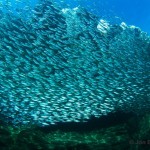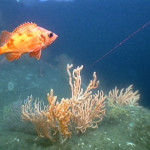Two weeks ago I wrote about southeast Asian fishermen, mostly from Cambodia, being forced to work Thai and South Korean fishing vessels. Men are promised other work in Thailand then are forced to stay at sea for up to two years or even longer with no contact with family or time off ship. Their wages are often subject to cuts through several layers of middlemen, making their earning effectively negligible. It is very troubling story that needs much more attention. This is another example of how our choices in the western world affect the lives of those in faraway countries that we typically ignore.
IRIN, the Humanitarian News and Analysis service of the UN Office for the Coordination of Humanitarian Affairs, reported on this major problem recently:
“Taing Ky* and his cousin were told they would be gardeners in Thailand, but instead they were forced to work on Thai fishing boats.
Each year, hundreds of Cambodian men, many impoverished farmers, are lured from their homes with the promise of better-paying jobs in Thailand, only to find themselves on Thai fishing boats plying the waters of the South China Sea.
“We were told we would earn good money,” Taing Ky, 37, a father-of-five from Cambodia’s Kampot Province, about 200km southwest of Phnom Penh, told IRIN. After six months, they managed to escape while the boat was offloading on Benjina island in northern Indonesia. There they were picked up by local authorities.
Thousands of Cambodian men are now believed to be working against their will in exploitative working conditions on long-haul trawlers well beyond the reach of law enforcement agencies, and often alongside Burmese men. ” *-Not his real name
There are reports of 20 hour work days, regular beatings by crew and officers, inadequate food, and being forced to work at gun point. This goes beyond the “oh, it’s just how things go in the third world” mindset. This is blatant 21st century slavery. Very little difference from the types of slavery endured for centuries by Africans and their descendants around the Americas. According to the article, “those deemed expendable are tossed overboard”. Not able to work any longer? No point to your presence on the ship. I imagine that few, if any, survive.
Some of this might be from our choices half a world away, and out of sight. I don’t have data to back this up. Maybe all the fish they haul in is sold in China, Korea, or elsewhere. But I willing to place a high bet that some, possibly most, of the products make its way into the US, Canada, Australia and Europe. Sadly, this type of slavery is very hard to bust:
“Thai authorities say there is little they can do about the trafficked Cambodians working on Thai fishing boats, particularly when the alleged crimes occurred outside Thai waters, if they do not report it.
According to UNIAP, most of the deportees who were exploited choose not to report their cases due to fear of their broker, employer, or the police; a lack of understanding of their rights; and/or inability to speak Thai.”
But for those of us with a conscious and care about our fellow humans, even those that we will never meet or know, we should do what we can to reduce our consumption of products from the countries that turn a blind eye to human trafficking and slave labor in their fishing industries. Thailand has a very blemished record in human trafficking. I implore you to care as much as I and not support this inhumane and illegal practice by not buying seafood from these countries. If its a “product of thailand” put it back on the shelf. To make matters worse, many of these fishing vessels care little for sustainable fishing practices and accurate labeling of its products. If they treat their fishermen worse than dogs, how do you think they treat their seafood?
The solution to this problem is very hard. Boycott is the ultimate answer, there needs to be enforcement and international will to make this problem go away. Even that is not enough as the reasons these men get tricked in slavery runs much, much deeper. But, the LEAST we could do is not take part and send the message that fishermen’s livelihoods are more important than saving a few bucks on seafood. I am fortunate enough to live on the coast and purchase locally caught seafood at prices similar to the freezer section at the big chain grocery from fishermen who lives and jobs I can impact directly. This means a lot to me. Cause I know the fishermen here care about the ocean, they are born of the sea and spend all their lives here. I am proud to support my local fishermen.
I feel it is important to know where your food comes from. We are so disconnected from our sources due to the dozens of middlemen between us and the products we purchase. How do we know when our buying power fuels inhumanity and environmental ruin? More importantly, how do we get people to care? Maybe we need an ad campaign in popular magazine and billboards to get the word out. Marine conservation and seafood safety and labeling organizations need to take into account human factors and working conditions, as well as environmental problems and quota management.
Millions of consumers live away from the sea, away from sources of local seafood. Buying frozen products shipped from afar is their only option to enjoy seafood. The challenge is not create a certification process for seafood – which could get mismanaged or corrupted, rely on outdated science, or not take into account various levels of the manufacturing and shipping process – but to get a consensus among western consumers about what they are willing to risk, morally and financially, to acquire and consume seafood. I just know that I’m not willing to risk others’ lives and humanity for my seafood. I hope you feel the same.






Greetings. I posted this article to my blog
Keep up the good work.